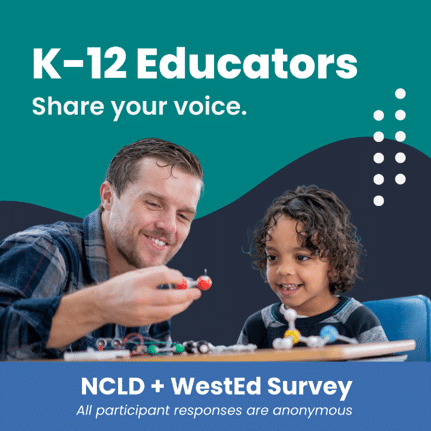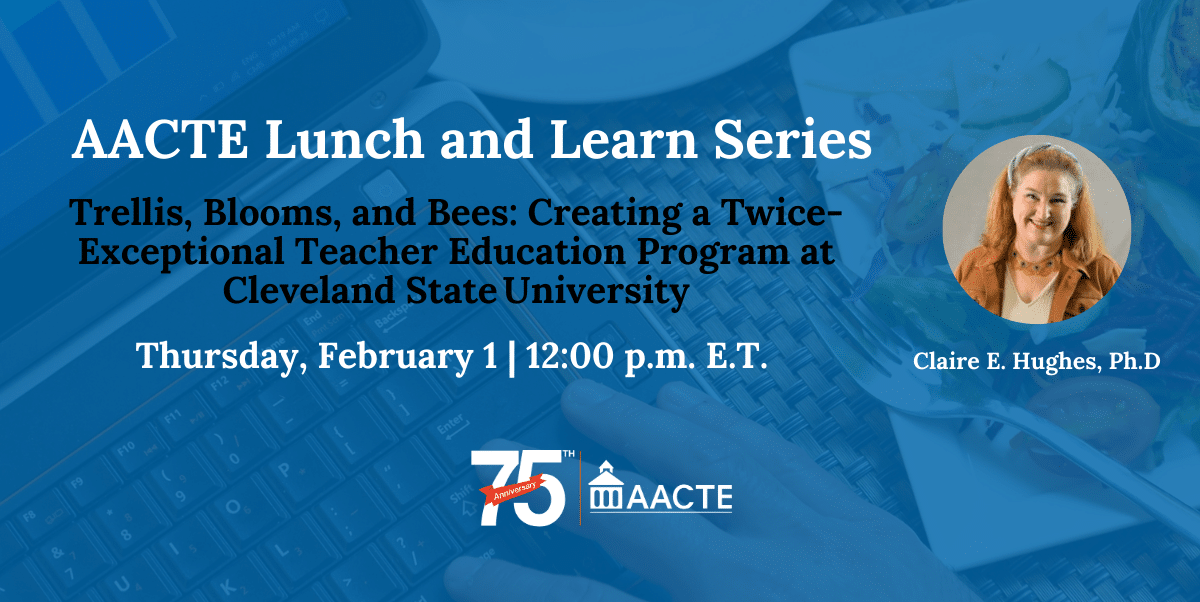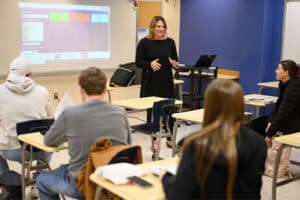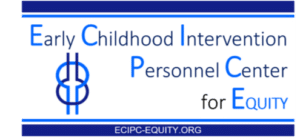02 Apr2024
By Lauren Wong
 My name is Lauren Wong and I am from WestEd, a nonpartisan, nonprofit organization engaged in educational technical support and research across the country. We are partnered with the National Center for Learning Disabilities, one of the nation’s leading organizations advancing the lives of individuals with learning disabilities through policy, innovation, practice, and outreach. We are working together to learn about the experiences, opinions, and perspectives of educators who teach students with learning disabilities.
My name is Lauren Wong and I am from WestEd, a nonpartisan, nonprofit organization engaged in educational technical support and research across the country. We are partnered with the National Center for Learning Disabilities, one of the nation’s leading organizations advancing the lives of individuals with learning disabilities through policy, innovation, practice, and outreach. We are working together to learn about the experiences, opinions, and perspectives of educators who teach students with learning disabilities.
We are surveying K-12 educators who teach students with learning disabilities. Your participation in this survey will help us understand your experiences teaching students with learning disabilities, the needs you have related to professional development and access to resources, and your school’s climate. All information shared will be kept secure and will be de-identified to protect your privacy and confidentiality. Results from this survey will be used to guide NCLD’s efforts in outreach, policy, and advocacy.
26 Mar2024
Championing Special Educators: Strategies for Recruitment & Retention in Educator Preparation, a Collaboration Between AACTE and CEEDAR
By Brooke Evans
On March 28, from 3:00 p.m. to 4:00 p.m. ET, special education teacher advocates are invited to attend the next meeting of the national affinity group, Championing Special Educators: Strategies for Recruitment & Retention in Educator Preparation. This meeting will explore wellness strategies for teacher candidates.
Tyler Hester, Ed.D. and Hallie Fox, Ph.D., both of Educators Thriving, a nonprofit organization that supports educators thriving as professionals and people, will share the most common pitfalls that lead to educator burnout and the six factors that predict educator well-being. Additionally, Casey Woodfield, Ph.D. and Alicia Drelick, Ph.D., faculty in the Wellness and Inclusive Services in Education Department at Rowan University will share practical strategies and tools they have used with preservice teachers in the classroom to center wellness and to humanize their teaching practices. Meeting attendees will explore a range of tools that center wellness and model person-centered approaches in the classroom.
26 Feb2024
By Shannon G. Magsam
Nursing, speech-language pathology, and occupational therapy students in the College of Education and Health Professions recently had the unique opportunity to work with children who have hearing loss at SPARK Day.
The college collaborated with the non-profit Arkansas Hands and Voices, which supports parents and professionals who work with children with hearing loss regardless of their communication approach.
SPARK — an acronym for Student Preparation to Care for ARkansas Kids — was partially funded through a WE CARE grant. The college’s future caring professionals gained clinical experience with this specialty population, a requirement of the American Speech-Language-Hearing Association for professional certification. The day also provided clinical training opportunities for those studying to be occupational therapists and nurses.
29 Jan2024
By Kansas State Department of Education
The Kansas State Department of Education (KSDE) will oversee an $8.4 million federal grant awarded to the state to create the Kansas Youth Transition Network, a statewide initiative that will help students with disabilities make the transition from education to employment.
“This grant will help youth with disabilities statewide connect to the supports that meet their individual needs as they transition from high school to college, other postsecondary opportunities, or directly into competitive integrated employment,” said Dean Zajic, assistant director for KSDE’s Special Education and Title Services (SETS) team and project director for the grant.
22 Jan2024
Lunch & Learn with Claire E. Hughes
By Brooke Evans

AACTE is pleased to offer Lunch & Learns: professional development opportunities for members. These 30-minute sessions are designed to provide you with an immediate tool or strategy to apply to your work. All Lunch & Learns will be available on-demand for AACTE members. Watch them during your lunch break or whenever it is convenient for you.
AACTE will continue its Lunch & Learn series with Trellis, Blooms, and Bees: Creating a Twice-Exceptional Teacher Education Program at Cleveland State University on Thursday, February 1, from 12:00 to 12:30 p.m. ET.
16 Jan2024
By AACTE
AACTE has joined the National Coalition on Personnel Shortages in Special Education and Related Services (NCPSSERS) to continue advancing toward solutions for the nationwide PK-12 special educator shortage.
NCPSSERS is a national coalition composed of more than 30 participating member organizations. Since 2006, NCPSSERS has been dedicated to addressing the issue of shortages in special education and related services personnel in schools.
15 Jan2024
Championing Special Educators: Strategies for Recruitment & Retention in Educator Preparation, a Collaboration Between AACTE and CEEDAR
By Brooke Evans
On January 23, from 3:00 p.m. to 4:00 p.m. ET, special education teacher advocates are invited to attend the third meeting of the new national affinity group, Championing Special Educators: Strategies for Recruitment & Retention in Educator Preparation. The third meeting, Clinical Practice Experiences will dive into the use of technology at both the University of North Georgia and the University of Virginia.
Michael J. Kennedy, Ph.D., and Rachel L. Kunemund, Ph.D., University of Virginia, will share how their faculty utilizes the COACHED Platform (Capturing Observations and Collaboratively Sharing Educational Data), a suite of evidence-based coaching tools and professional learning materials for teacher educators while also taking us on a tour of the free platform. Additionally, Jennifer Sears, Ph.D., the University of North Georgia, will discuss how her university uses the COACHED software and how this platform allowed the university to meet the needs of rural districts in her area.
18 Dec2023
By Judith Cebula
Lilly Endowment Inc. has approved more than $21.5 million in implementation grants to help 28 colleges and universities in Indiana prepare the next generation of teachers in methods aligned with the Science of Reading.
The Endowment made the grants through its initiative, Advancing the Science of Reading in Indiana (ASRI). The initiative aims to improve significantly the reading abilities of Indiana K-12 students by helping teachers strengthen their use of methods aligned with the Science of Reading, a vast body of research related to how children learn to read. Methods aligned with the research include explicit, systematic, and cumulative instruction focused on phonics, phonemic awareness, fluency, vocabulary, and comprehension.
The Endowment, which has long supported efforts to improve educational outcomes for students in Indiana’s K-12 schools, launched ASRI in 2022 to help address low reading achievement among Indiana students. Only 33% of Indiana fourth-graders scored proficient in reading comprehension in the 2022 National Assessment of Educational Progress, often called ‘The Nation’s Report Card.’
18 Dec2023
By Amanda Nelson
Before leading a classroom of their own, students preparing to become special education teachers are using mixed reality simulations to develop skills to be successful educators.
The UK SimLab at the University of Kentucky College of Education provides simulations for aspiring special education teachers across Kentucky. The simulations enable the college students to rehearse teaching in a controlled setting by interacting with avatars — brought to life behind the scenes by trained actors.
“The wonderful thing about using mixed reality simulations is that I can provide immediate feedback and coaching while the pre-service teacher is practicing the teacher behavior,” said Kera Ackerman, Ph.D., assistant professor of special education, UK College of Education. “We can pause the simulation to provide a correction, and then restart the simulation to practice the behavior again. We always say that it is the place to make a mistake because there is no impact on P-12 learners.”
20 Nov2023
Championing Special Educators: Strategies for Recruitment & Retention in Educator Preparation, a Collaboration Between AACTE and CEEDAR
By Brooke Evans
On November 30, from 3:00 p.m. to 4:00 p.m. ET, special education teacher advocates are invited to attend the second meeting of the new national affinity group, Championing Special Educators: Strategies for Recruitment & Retention in Educator Preparation. The second meeting, Making a Special Education Degree Affordable, will dive into two educator preparation programs that are using Teacher Quality Partnership Program (TQP) grants to financially enable students to pursue a special education degree.
American University’s Carolyn Parker and Sarah Irvine Belson will share information on their recent TQP-funded program, Residency for Excellence in Teaching and Learning (RETL), a master’s program that is being developed through a unique initiative that will leverage the resources and expertise of a partnership between American University’s School of Education, College of Arts and Sciences, and the Friendship Public Charter Schools (FPCS).
23 Oct2023
Championing Special Educators: Strategies for Recruitment & Retention in Educator Preparation, a Collaboration Between AACTE and CEEDAR
By Brooke Evans
On October 31, from 3:00 p.m. to 4:00 p.m. ET, special education teacher advocates are invited to attend the first meeting of the new national affinity group, Championing Special Educators: Strategies for Recruitment & Retention in Educator Preparation. The first meeting, Multiple Pathways into the Profession, will dive into two educator preparation programs providing innovative ways for students to obtain special education educator licensure.
Elena Andrei, Ed.D., and Claire E. Hughes, Ph.D., of Cleveland State University will share information on their DREAM project, a master’s program degree that results in two initial licensures (P-5, Early Childhood Intervention Specialist), and a TESOL endorsement.
16 Oct2023
By Michelle Damiani
The AACTE Co-Teaching in Clinical Practice Topical Action Group (TAG) recently wrapped up two exciting initiatives focused on bringing teacher preparation faculty together with administrators and teachers in schools across the country. A recurring theme coming from our TAG activities emphasizes the need for systemic change, something that will most effectively occur with collaboration across institutions and school-university partners.
Teacher preparation institutional partnerships with local school districts where co-teaching is valued seem to be increasing expertise for clinical interns, practitioners, and the higher education teacher preparation faculty involved.
31 Aug2023
By Lyna Kelley

Photo by Justin Merriman
A truly one-of-a-kind initiative, Thomas More University’s School of Education launches the commonwealth’s first Dyslexia Institute. The institute supports students and the greater community through sharing resources that are intentionally designed to promote awareness and create change by highlighting the dyslexic profile. Fully understanding the impact of dyslexia enables parents, teachers, and employers to ensure dyslexic children and adults have the support needed to thrive. Programming through the institute includes assessment clinics, teacher training, direct family support, and more.
“Thomas More is the first university in the commonwealth to have a dyslexia-specific resource for our students and our community,” explains Kayla Steltenkamp, Ph.D., assistant professor in the School of Education. Steltenkamp is a renowned expert in the field of literacy and dyslexia and leads the new initiative. “The Thomas More University Dyslexia Institute is a preeminent source in Kentucky to disseminate the latest research, share practical resources with the community, and to transform the instruction and intervention for all dyslexic children and adults,” adds Steltenkamp.
22 Aug2023
By Nicole Dunn

Last month, AACTE announced its new partnership with the Early Childhood Intervention Personnel Center on Equity (ECIPC-E), a national center federally funded by the U.S. Department of Education’s Office of Special Education Programs to assist states in building comprehensive systems of personnel development to improve outcomes for infants and young children with disabilities and their families.
As part of this partnership, AACTE will recruit, mentor, and support a cohort of 12 Holmes scholars in early childhood special education doctoral degree programs.
25 Jul2023
By Weade James
 AACTE is excited to announce a new partnership with the Early Childhood Intervention Personnel Center on Equity (ECIPCE), a national center federally funded by the U.S. Department of Education’s Office of Special Education Programs to assist states in building comprehensive systems of personnel development to improve outcomes for infants and young children with disabilities and their families. ECIPCE has awarded AACTE a 5-year sub-award to support a cohort of 12 Holmes Scholars pursuing doctorates in early childhood and early childhood special education.
AACTE is excited to announce a new partnership with the Early Childhood Intervention Personnel Center on Equity (ECIPCE), a national center federally funded by the U.S. Department of Education’s Office of Special Education Programs to assist states in building comprehensive systems of personnel development to improve outcomes for infants and young children with disabilities and their families. ECIPCE has awarded AACTE a 5-year sub-award to support a cohort of 12 Holmes Scholars pursuing doctorates in early childhood and early childhood special education.
More early childhood leaders and practitioners with the requisite skills and knowledge are required to meet the needs of children aged birth – 5 years old. This partnership will directly address this issue, in part, by providing targeted mentorship, professional development, and financial support to doctoral students of color pursuing a Ph.D. or an Ed.D. in early childhood and early childhood special education.
 My name is Lauren Wong and I am from WestEd, a nonpartisan, nonprofit organization engaged in educational technical support and research across the country. We are partnered with the National Center for Learning Disabilities, one of the nation’s leading organizations advancing the lives of individuals with learning disabilities through policy, innovation, practice, and outreach. We are working together to learn about the experiences, opinions, and perspectives of educators who teach students with learning disabilities.
My name is Lauren Wong and I am from WestEd, a nonpartisan, nonprofit organization engaged in educational technical support and research across the country. We are partnered with the National Center for Learning Disabilities, one of the nation’s leading organizations advancing the lives of individuals with learning disabilities through policy, innovation, practice, and outreach. We are working together to learn about the experiences, opinions, and perspectives of educators who teach students with learning disabilities. 









 AACTE is excited to announce a new partnership with the Early Childhood Intervention Personnel Center on Equity (ECIPCE), a national center federally funded by the U.S. Department of Education’s Office of Special Education Programs to assist states in building comprehensive systems of personnel development to improve outcomes for infants and young children with disabilities and their families. ECIPCE has awarded AACTE a 5-year sub-award to support a cohort of 12 Holmes Scholars pursuing doctorates in early childhood and early childhood special education.
AACTE is excited to announce a new partnership with the Early Childhood Intervention Personnel Center on Equity (ECIPCE), a national center federally funded by the U.S. Department of Education’s Office of Special Education Programs to assist states in building comprehensive systems of personnel development to improve outcomes for infants and young children with disabilities and their families. ECIPCE has awarded AACTE a 5-year sub-award to support a cohort of 12 Holmes Scholars pursuing doctorates in early childhood and early childhood special education.